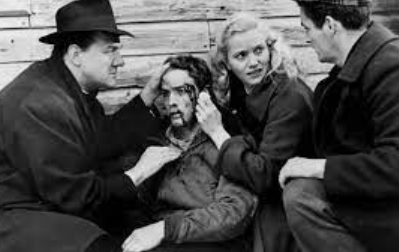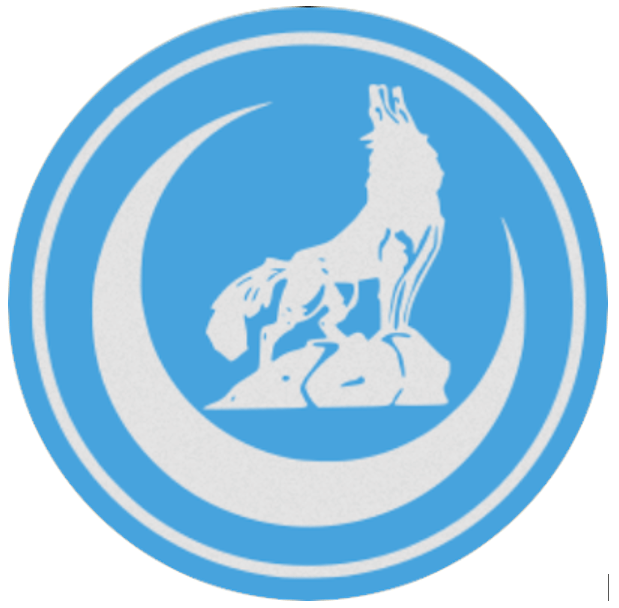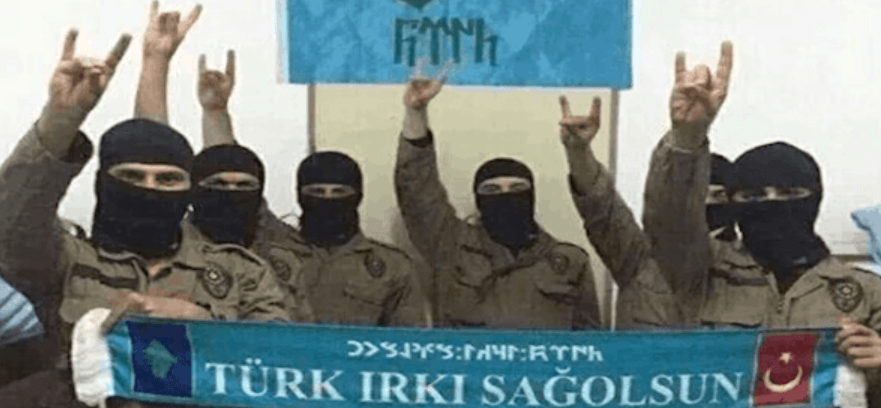by Cenk Agcabay
The subject of the film On the Waterfront, released in 1954, is the struggle of workers with mafia organizations trying to suppress the growing dockers’ movement in the US. In the film, Marlon Brando portrays a gang member who initially tries to suppress the dockers by force.
However, the character experiences a transformation over time and joins the fight alongside the dock workers. The screenplay for the movie was written based on actual events of that period reflected in a series of articles in a daily newspaper.
As is well-known, mafia groups played an essential role in suppressing the working-class struggle in the US. In that era, the state apparatus in the US had active secret services, police, and military to suppress the growing movement of the working class. Yet, mafia groups, a highly empowered force at the time, were involved in operations to suppress the working class as either an integral or a complementary part of the state forces.

Moreover, this dynamic is not specific to America but extensive in many other countries where it was also common to use mafia groups both as a force in operations to suppress popular revolutionary movements and as a source of financing through the drug and arms trade. US imperialism used this method effectively in suppressing the popular revolutionary movements developing in Latin America when it declared war against communism worldwide.
Thus, the US’s liberal democracy did not exclude the use of mafia groups in this manner both inside and outside, because the state apparatus was a class power with the interests of the bourgeoisie at its core. Therefore, its primary motive was the protection and expansion of these interests by one or another means. This could be provided by soldiers and police, as well as by the mafia. Besides, hadn’t capitalism already started with piracy?
Licensed Pirates
It is interesting to note that the French word for shipowner (armateur) means both the charterer and the pirate or the captain of the pirate ship. Economic historian Werner Sombart, who discusses the birth and development processes of capitalism in Europe, explains the reason for the binary meaning of the word: “In the XVI century, the people who sent ships to Africa or America were both one and the other” (Werner Sombart, 2008, Burjuva, İstanbul, Doğu Batı)
So they were doing not only sea transport but also piracy. In the words of the British historian Niall Ferguson, British capitalism was started by stealing gold Niall Ferguson. Empire: The Rise and Demise of the British World Order and the Lessons for the Global Power, New York, Basic Books).
When British pirates attacked Spanish ships carrying gold and silver from America to Europe, these actions were presented as individual initiatives. The lion’s share of the spoils flowed to the British palace, according to the agreement. This was called licensed piracy. The licensed pirates could even receive the title of ‘Sir’ from the palace after their successful campaigns. As well, in some cases, they could be appointed as governors and judges to the newly captured colonies.
As can be seen, the pirates, who can be considered the mafia groups of that period, were crucial actors in the ‘irregular’ warfare waged on the seas and were integral or complementary parts of the official royal navies of the period. They made significant contributions to the initial accumulation processes of capital. When the rulers of England did not have the power to wage a ‘regular’ war against Spain, they worked with ‘irregular’ methods of war.
Turkey and NATO
The story of the ‘irregular’ war in Turkey extends to Turkey’s NATO membership. After American imperialism started the war against communism, the formation of NATO-based criminal organizations gained momentum in NATO-member Turkey. NATO, which reorganized the police and the army against the anti-imperialist and socialist movements developing in Turkey, also illegally organized fascist and religious organizations.

Racist-fascist and political Islamist organizations rapidly developed under NATO’s protectorate in the 1960s and 70s. In the 70s, the NATO-led fascist Grey Wolves, who engaged in a high level of violence against the developing worker and peasant movements, organized attacks that killed thousands of people.
The founding leader of the fascist Grey Wolves was Alparslan Türkeş, the first Turkish officer to serve in NATO. After his retirement, he became the head of the fascist organization and ordered extensive massacres. During the worldwide war against communism, the Grey Wolves gained a wide sphere of influence in politics with the strong support of the USA and NATO. They attained important positions in state organizations of Turkey.
‘Irregular warfare’ is a military doctrine produced in imperialist NATO centres to use in the war against communism. One of the important works written in this context by David Galula is titled Counterinsurgency Warfare: Theory and Practice. It was translated and published in 1965 by the General Staff in Turkey.
According to the book, which was published by one of the central institutions in the country, “the underground elements of an irregular force do not have legal status as a rule.” (Cited in Suat Parlar, 1997, Kontrgerilla Kıskacında Türkiye, İstanbul, Bibliotek). These “underground elements” are an organic part of the state’s war against popular revolutionary movements, but they are not restricted by any legal framework. Therefore, they have unlimited freedom to commit crimes against the people.
Mafia boss videos reveal ‘Irregular’ War in Turkey
With the events in Turkey in the last few weeks, the political crisis has rapidly deepened. Sedat Peker, one of the leading chiefs of the Fascist Grey Wolves and a mafia organization, took refuge in the United Arab Emirates. Here, Peker published videos in which he reveals important information about the state, the mafia, and political relations in Turkey. These videos have been watched and shared by millions of social media users.
The ‘irregular war’ waged against popular revolutionary movements in Turkey in the 1960s and 70s has turned toward the struggle of the Kurdish people for their democratic-political rights since the 1980s. In this context, extrajudicial executions and torture became the usual ‘irregular war’ practices in the 1990s and continue to the present day.
This is so much so that, when Sedat Peker disclosed his deep relations with the state in the videos he published, Süleyman Soylu, the Minister of Internal Affairs of the Turkish state, replied, “Organized criminal organizations are one of the most important apparatus of irregular war.”
Peker’s disclosure campaign is based in the United Arab Emirates. This country, where the Turkish government has had the most challenging conflicts in recent years, runs like a US province in the region. It is not possible to continue a campaign carried out from there, which creates political shocks in Turkey, without the approval of the ‘colonial governor’ of the province. This means that a political will has taken action intending to dismantle the existing alliance configuration of President Tayyip Erdogan and provide the conditions to form new political power.
Criminal organisations nested within the state
When Tayyip Erdogan came to power nearly two decades ago, he promised to fight decisively against criminal organisations nested within the state. Peker’s revelations indicate that Tayyip Erdogan and the Justice and Development Party (Adalet ve Kalkınma Partisi, AKP) government have instead developed a strong relationship with these organizations and established a close partnership against the workers’ and oppressed peoples’ struggles. The confessions of Sedat Peker are crucial both in terms of revealing the extent of state protection provided to mafia organizations and in terms of shedding light on some unidentified political murders committed in Turkey in the 1990s.
The desire of the Turkish capitalist class to obtain a larger share of the Middle East market, as well as Middle East energy resources, has been the primary motivation of the foreign policy implemented by the AKP government for 15 years. In the process, the state’s ‘irregular warfare’ strategy went beyond its borders and extended from Syria to Libya.
Jihadist gangs (pictured above) and fascist Grey Wolves were settled in Syria by the Turkish state in line with the ‘irregular war’ and committed massacres in Syria. At that time, one of the firm allies of the state, Sedat Peker, who gifted weapons and military vehicles to these forces fighting in Syria, was praised in the press.
Revelations by the Mob Boss
As a result of the rent-sharing fight between these actors, Sedat Peker left Turkey and went on a journey that ended in the United Arab Emirates. A crucial piece of information Peker gave in his videos was about the murder of Ugur Mumcu, one of Turkey’s well-known journalists, by a bomb planted in his car in 1993.
Ugur Mumcu’s books and writings traced the mafia groups in Turkey and their relationship with the Turkish state’s security organizations and the CIA. No traces of the perpetrators of this bombing in 1993 have been found or punished. Peker has stated that this murder was carried out by authorized personnel in the Turkish Armed Forces Special Forces Command.
Peker also made important statements about another political assassination committed in Cyprus. The journalist Kutlu Adali, who had advocated throughout his life in Cyprus for the peaceful coexistence of the Turkish and Greek people in a single state with equal rights, died in 1996 after an attack. Sedat Peker stated that Kutlu Adali was killed in an operation commanded by Korkut Eken, one of the Turkish Armed Forces Special Operations Forces’ commanders.
The most substantial proof of Peker’s claim is a trip that Korkut Eken made to Cyprus at that time with Peker’s brother Atilla Peker. After Sedat Peker’s statement, his brother Atilla Peker was detained in Turkey. In his statement, Atilla Peker stated that he went to Cyprus with Korkut Eken and that Eken used expressions about Kutlu Adali such as “traitor,” and “he will sell Cyprus to the Greeks.” Answering the questions of journalists, Korkut Eken admitted that he went to Cyprus with Atilla Peker. As Special Forces Commander, he left unanswered questions about his reasons for traveling with a mafia leader.
Deepening the ongoing political crisis
Peker also claimed that AKP politicians close to Tayyip Erdogan took part in cocaine trafficking with South America. All these statements led to a debate within the AKP and deepened the ongoing political crisis in Turkey. Some voices within the AKP arose in protest, breaking the ties with the AKP’s ally, the fascist Grey Wolves’ Nationalist Movement Party (Milliyetçi Hareket Partisi, MHP).

However, Tayyip Erdogan’s response indicated that he is determined to continue the alliance. which reflects the acceptance of the state’s association with mafia organizations from the highest level. Since the state institutions are under the control of the AKP and the fascist Grey Wolves, no prosecutor initiated any legal action after these crucial statements. The AKP-MHP government, which has completely turned into a criminal empire, uses threats and blackmail as weapons to suppress rising criticism.
It is a common belief that Sedat Peker may soon make new and direct allegations about Tayyip Erdogan and his family. Millions of people are waiting for these revelations and if they happen, the depth of the political crisis will increase. Likewise, the pressure and violent practices of the AKP-MHP government against those who resist will also increase.
Peker is expected to expose the secret activities of the AKP-MHP government in Syria and Libya. Peker hinted at this in one of his videos. Information on Tayyip Erdogan’s role in the dirty war in Syria for ten years is essential. The revelations are from the United Arab Emirates, and it is not easy for the UAE to host such a business without the permission of its boss, the United States.
In this context, it can be seen that Peker’s revelations have turned into a geo-strategic weapon in the hands of the USA, as it did not, somehow, prevent the publication of these videos. The aim might be to drive the AKP and Tayyip Erdogan into a corner to align Erdogan with the US policies in the Middle East, Black Sea, and the Caucasus.
This article was first published on Sosyalist Kritik website.



